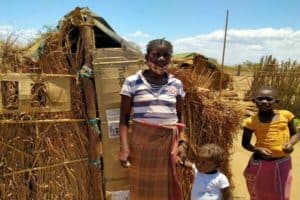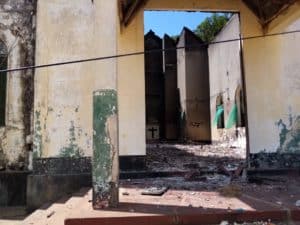During war in Mozambique, ‘those who suffer most are the poor’
“WE ARE LIVING HERE IN A TIME OF WAR that has already lasted three years. It began with an attack on the police station, then on the distant villages, passing through the larger villages until it reached the center of the cities. Four cities have already been almost completely emptied. By now, this war has killed more than 2,000 people and we now have more than 500,000 displaced people.” This is what Bishop Luiz Fernando of Pemba, Mozambique, told Aid in the Church in Need (ACN). The diocese is in the north of Mozambique, where there have been continued attacks by Islamist terrorists.
Just minutes before his interview with ACN, the bishop received more sad news from Nangololo, where the Mission of the Sacred Heart of Jesus used to be: “The second most important mission of the Diocese has been totally destroyed—the church, the priests’ house, the sisters’ house, the community radio, the outpatient clinic—all totally devastated. The people had already fled the mission through the woods, to other cities and here to Pemba. We help many people, so that they can go to safer places.”

Helping victims of the attacks has become Bishop Lisboa’s priority in recent years: “Over half a million displaced people need everything! They need food, clothes, medicine, pots, they need attention, a place to live, everything. It is a war that has brought much suffering to all of us.
“All along, the Church has lent its voice to be the voice of the poor, of those who have no time, of those who do not have the opportunity of being in front of a camera, as I am now, and of being able to speak. This is the first work: to speak, to show reality. The Church has worked through Caritas, which is its humanitarian arm, to respond to this emergency we have experienced.”
The Bishop of Pemba has become the main voice denouncing what happens in Cabo Delgado: “The Church is committed to the truth because we follow Jesus, who said: ‘I am the way, the truth and the life.’ All the missionaries are united. We are all working to minimize this humanitarian crisis, to meet the most vulnerable, to try to do something to reduce suffering. We are not afraid because we are telling the truth.
“What we have spoken is what Pope Francis speaks about so often: we want to save people’s dignity, we want social justice, we want people to have their rights respected, we want people to live in peace. This is not asking too much. It is in the constitutions of all countries, in the Universal Declaration of Human Rights, in the Bible itself and in the Koran. What we religious people ask for is peace. Is it too much to ask for peace? That is the work of the Church.
“While we pray, we also work, we meet people, we are activists for peace to come. Peace is a building- process and it is important to involve the people, not only the people of Mozambique, but the international community. Behind every war there are those responsible. There are no winners in wars. We all lose. There are people who profit, they think they win, but they are also losers.”

The bishop of Pemba is concerned to make it clear that it is not a war only against Christians: “Christians are not the main target of terrorists. Many important Christian churches like the one I have mentioned, the mission of Nangololo, have been burned. The historic church of Mocímboa da Praia has been burned as well as many rural chapels. However, mosques have also been burned. Catechists have been killed as well as community animators, two sisters, but also a Muslim chief and other leaders. So, it is not a war against Christians. Among the religious leaders here in Cabo Delgado, Mozambique, we have a good relationship and there has never been a problem between us.”
The Bishop’s greatest concern is that “this terrorism has made our people suffer; it has delayed the dreams of many people. Every year we already suffer from hunger at a certain time of the year. For three years now, many people have not been harvesting. Therefore, the hunger will be even greater. War has only losers, but those who suffer most are the poorest.” ACN has mobilized to help the victims of this conflict in Cabo Delgado. Since the attacks began in 2017, ACN has been calling attention to the crisis.
The bishop continued: “What the Mozambican people want most is peace. Mozambique has already faced two wars and here in Cabo Delgado we are facing the third. The people are tired; they are suffering a lot from this war. The people of Cabo Delgado, of Mozambique, long for peace. We are grateful for this worldwide solidarity with our situation here and with all the dead, from this war and other wars. We cannot be indifferent to the suffering, the pain, the death of so many of our brothers and sisters.”
To the benefactors of ACN, the bishop sent this message of gratitude for all the collaboration: “From the bottom of my heart I thank all the benefactors of ACN. Here in the Diocese of Pemba, even before the war, before Cyclone Kenneth, we have been helped by ACN. They have already helped us in supporting the formation of seminarians, in supporting the spirituality and formation of priests and sisters; they have already helped us with cars for our missionaries. At this time of emergency, because of the war; they have already approved emergency aid projects. Thus, my many thanks. May God deeply bless each person who collaborates with this truly missionary work. Thank you very much, may God bless you.”
—Rodrigro Arantes

